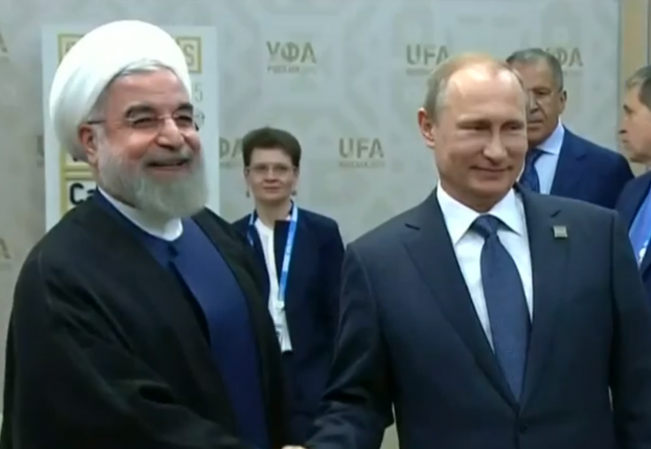 US Sanctions Russia-Iran Oil Network Funding Hezbollah, Hamas
US Sanctions Russia-Iran Oil Network Funding Hezbollah, HamasVijeta Uniyal | 11/22/2018 - 3:00pm
The U.S. Treasury has sanctioned an illicit Iranian-Russian network supplying oil to the Syrian regime. The elaborate oil scheme was used to finance the Islamic terror groups Hamas and Hezbollah, a department press release said Tuesday.
The covert shipment of Iranian oil was run by the aid of the Russian state-owned company Promsyrioimport. The network delivered millions of barrels of oil to Syrian dictator Bashar Assad’s regime and hundreds of millions of dollars to Islamic terrorist groups, the Treasury Department disclosed.
“The Iranian regime continues to prioritize spending money on fomenting terror over supporting its own people,” the Treasury’s counter-terrorism chief Sigal Mandelker said, “This is yet another example of the regime using the proceeds of millions of barrels of its oil to fund terrorists and the murderous Assad regime to the detriment of its own people.”
Those targeted include a Syrian national and the Russian company Global Vision Group, which played the key role in oil shipments and money transfers to Iran’s Islamic Revolutionary Guard Corps (IRGC), a designated terrorist organization.
The press release issued by the U.S. Treasury details Russian and Iranian involvement in the busted oil-for-terror scheme:
Today, the U.S. Department of the Treasury’s Office of Foreign Assets Control (OFAC) is designating nine targets in an international network through which the Iranian regime, working with Russian companies, provides millions of barrels of oil to the Syrian government. The Assad regime, in turn, facilitates the movement of hundreds of millions of U.S. dollars (USD) to the Islamic Revolutionary Guard Corps-Qods Force (IRGC-QF) for onward transfer to HAMAS and Hizballah. U.S. sanctions prohibit material support to the Government of Syria, including shipments of oil to Syrian government-controlled ports, as well as material support to designated terrorist groups.
“Today we are acting against a complex scheme Iran and Russia have used to bolster the Assad regime and generate funds for Iranian malign activity,” said Treasury Secretary Steven Mnuchin. “Central Bank of Iran officials continue to exploit the international financial system, and in this case even used a company whose name suggests a trade in humanitarian goods as a tool to facilitate financial transfers supporting this oil scheme. We are issuing an Advisory today identifying the grave risks to the maritime community if they participate in shipping oil to the Government of Syria. The United States is committed to imposing a financial toll on Iran, Russia, and others for their efforts to solidify Assad’s authoritarian rule, as well as disrupt the Iranian regime’s funding of terrorist organizations.”
The Treasury Department’s revelations come just weeks after President Donald Trump announced tough sanctions targeting Iran’s oil and gas sectors. “Our objective is to force the regime into a clear choice: either abandon its destructive behavior or continue down the path toward economic disaster,” President Trump said at that time.
Facing economic crisis at home in the wake of biting sanctions imposed by the Trump administration since withdrawing from the nuclear deal in May, the Iranian regime is looking for new ways to finance its terrorist proxies across the region, especially Assad-led Syrian regime. President Vladimir Putin has also thrown the Russian military behind Assad out of geostrategic considerations.
It may be in Moscow’s interest to gain a foothold in the Middle East or have access to Syria’s coveted warm water ports, but given the Muslim-majority provinces in Russia’s Caucasus region, the funding of Shi’a and Sunni terrorist groups to the south of its borders could come back to bite in the long run.
The unraveling of the oil scheme once again highlights the link between the Shi’a and Sunni terror networks, notwithstanding their professed theological differences. When it comes to terror financing, there has been no love lost between the jihadis of all stripes despite their ongoing inner-Islamic power struggle.
No comments:
Post a Comment